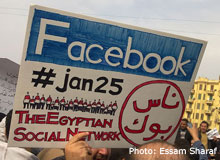After watching Arab Spring protests topple regimes in Tunis and Cairo, Shiite protestors in Bahrain took to social media to organize their own movement against the royal family. They were unaware these same online efforts would be turned against them by the country’s internal security forces, which used pictures from profile pages to identify protestors, and also hosted a Facebook page, "Together to Unmask the Shiite Traitors," which acted as a virtual snitch line.
As it continues to punish its rebellious citizens, Syria has adopted more proactive tactics, closely monitoring social media sites to identify people as protests happen. According to The New York Times, protestors are forced to give up the passwords to their Facebook accounts and are jailed. The newspaper reports that Syrian activists are creating false accounts as a countermeasure.
The news is replete with headlines of just how closely authorities are monitoring social media, even in the West. A number of people have been arrested in the U.S. for making threats on Facebook. Recently, Twitter and Google Blogger announced they would abide by requests from authorities in countries to block content deemed ‘offensive.’ Social media has become a flashpoint in the Muslim world for non-political issues too: An Indonesian man made headlines in January after his arrest for making comments on Facebook about religion, while a expatriate woman in the United Arab Emirates was held last year for insulting Islam on the social media site.
The position security agencies take is that data analysis of social media is important, providing them with another tool to identify potential terror threats and criminal activity, as well as assisting emergency response in crises. But advocacy groups are concerned that such surveillance goes far beyond that scope, and that often social media is monitored in countries to abuse human rights and thwart political opposition, with the assistance of Western-developed technology.
"Social media has great potential benefit," says Andrea M. Matwyshyn, assistant professor of legal studies and business ethics at the Wharton Business School. "It has changed the dynamics of organization, such as the Arab Spring or Occupy Wall Street movements. On the other hand, social media have complicated privacy protection. Service providers can locate any political dissident through a device or software."
The Voice Amplifier
The Arab Spring owed much of its potency to social media, allowing protestors to quickly mass organize, provide an alternative outlet for information, and the ability to aplify a voice and distribute images globally. According to the Dubai School of Government’s ongoing study of social media use in the Middle East and North Africa (MENA) region, as of last November there were 36 million Facebook users, almost double the number from 2010. Additionally, the number of Facebook users in the region increased by 68% from the start of the Arab Spring protests in January up until nearly the end of last year.
According to the study done by the Dubai School of Government, the most popular hashtags during the Arab Spring were #egypt, #libya, #jan25, #feb14, and #sidibouzid. The same study, among others, showed correlation between social media expression and activism. All research points out that large volumes of traffic were registered by social media sites on days preceding protests, or significant events, such as a political resignation.
A ‘Project on Information Technology and Political Islam’ done by Washington University showed that Tunisians’ blogs discussed liberty (10%) and revolution (18%) at the climax of the protests. The study noted that when political change seemed attainable, activists were willing to say publicly from where they were tweeting. As tech-savvy activists spread the word abroad, they used Twitter and group blogs like Nawaat to re-direct international journalists to videos and comments, posted on Facebook, forums or YouTube.
At first, authorities in countries rocked by Arab Spring protests, such as Egypt, sought to cut off Internet access. But security agencies have since come to the realization that social sites such as Facebook provide a treasure trove of data for evaluation, beyond drawing up portraits of social media users, or linking upheavals with intense social media activities. Instead, agencies actively mine data from social media sites with different methods, such as searching for key words and making associations of phrases.
Most likely your social media accounts are already under scrutiny, even in the United States. According to a Freedom Of Information Act lawsuit brought by the Electronic Privacy Information Center (EPIC) against the Department of Homeland Security, the agency announced last February it would be monitoring social media data, and pass such information along to "federal, state, local, and foreign government and private sector partners."
EPIC has detailed the sorts of data U.S. authorities are scanning social media for –keywords, ranging from any mention of terrorist groups like the Taliban or explosives, to seemingly innocuous, random words such as ‘exercise’ or ‘subway.’
"The new communication tools have transformed social movements and communication," Matwyshyn says. "Governments are training a digital army at an advanced level, to the same extent as the regular one. They confront a new type of organization which is often decentralized."
More Aggressive Censorship
Such scrutiny has brought new curency to some old laws. In a number of Middle Eastern countries, it has long been a crime to directly criticize government, but the penalties and the willingness to prosecute varies by country. Spreading news abroad is a crime in Syria, and dissidents are often threatened with death. In Egypt, state security agents used Facebook and Twitter as a source of information to anticipate movements and trace individual activists. Wael Ghonim, a regional Google executive turned revolutionary, was arrested in protests while his Facebook group topped 300,000 people.
Throughout the region, the state often controls the telecom operators, and so protects itself with rules designed in its favor. Telecom regulations allowed Tunisian authorities to intercept and check e-mails, for instance. In the Gulf, recent Internet-specific laws criminalized the critique of heads of state on social media and forums, and bloggers can be fined or arrested. Yet, in a survey after the Arab Spring conducted by Harvard’s Berkman Center for Internet and Society, half of the respondents still admitted to criticizing their government.
"Censorship has become more aggressive," says Helmi Noman, senior researcher at the Citizen Lab, University of Toronto’s Munk School for Global Affairs, and also a researcher at Harvard’s Berkman Center for Internet and Society. "Yemen and Syria pursued online portals which offer different coverage than state-controlled media. Saudi Arabia blocked Twitter accounts of reform advocates, and Bahrain stopped more opposition websites."
Middle Eastern countries also often control Internet Service Providers, and set policy on websites that are blocked. Even before the Arab Spring protests , many Middle Eastern countries, such as Bahrain and Egypt, used electronic surveillance and sanctions, according to the OpenNet Initiative (ONI). "Interestingly, the concept of religious obedience to Wali Al Amer (Arabic for a ‘person in authority’) was invoked in several troubled countries, to suppress calls to topple the regime," Noman says.
State censors are becoming savvier in their filtering techniques as they target social media. Hacking dissident web sites or blogs has become common. An ONI report stated that three Western firms provide filtering technologies to Middle Eastern countries which use them for a state-sanctioned censorship. According to Noman, more attention is paid to Arabic content, even by these Western filtering technologies.
Seeking a workaround, Arab activists have sought different methods to escape censors. "Activists in the region became savvy in bypassing filtering," Noman says. "The use of circumvention tools such as Tor and Psiphon, is becoming more widespread." Amid social media blackouts, Libyans sent memory cards of cameras to Egypt with films of unrest. Mobile phones are used to film and post videos from Syria.
Not Hiding Well
Despite the risks, Middle Eastern bloggers do not put their safety first, according to the Harvard study. Instead, most indicated that design and ease of use were more important factors when choosing an online platform. "Blogging with security takes more time and is more difficult," says Rob Farris, research director at Harvard’s Berkman Center.
Even if blogging anonymously or under a pseudonym has become common, only 16% of respondents to the survey noted they avoided giving personal identifiable information on their blog. The survey found, for instance, that Egyptians usually write with their real name. The survey also noted that only a tiny part of their respondents really understood safety procedures. Syrian bloggers were the most prudent, likely because of the severe repression they would face.
Blogging platforms from the U.S. are thought to be considered immune from political pressure to reveal members’ information. "It is very unusual for these companies to share information, versus internet source providers," Farris notes. "Google even publishes some requests for disclosure and the demanding authorities," Matwyshyn adds.
With social media so intimately tied to revolutionary efforts in the region, it is hard to escape battle metaphors when examining the issue in the Middle East. "Offensive hackings have increased significantly since the Arab Spring, disrupting the flow of information, or destroying content," Noman notes. "It is not unusual to see electronic armies in pro-regime and anti-regime groups."
There is undeniably a legitimate security aspect for governments fighting terrorists. Pursued by Western forces, most Muslim militant groups, such as al-Qaeda, resort to the Internet to ferry out messages to followers. Communication via e-mails, Internet relay chat and instant messaging are more difficult to trace as there is no accessible history. Many groups communicate through message boards and Internet forums. Spiders are put on each suspect forum to collect information. Besides basic content analysis (words, images, videos, hyperlinks), interaction between forum master and audience is carefully analyzed.
"Governments have to stay up-to-date because cyber-criminals are innovative," Matwyshyn says, but notes the thin line they must tread. "If protests are seen as a crime by some governments, and they are considered as solidarity or free expression by the public, it is a difference between public and strictly legal analyses."



